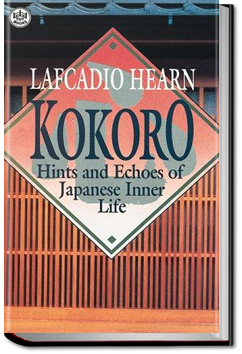

So she was persuaded to wear the same dress as other nuns.
They built for her a small An-dera, or Nun's-Temple, in an empty court where another and larger temple, called Amida-ji, had once stood. The An-dera was also called Amida-ji, and was dedicated to Amida-Nyorai and to other Buddhas. It was fitted up with a very small altar and with miniature altar furniture. There was a tiny copy of the sutras on a tiny reading-desk, and tiny screens and bells and kakemono. And she dwelt there long after her parents had passed away. People called her the Amida-ji no Bikuni,—which means The Nun of the Temple of Amida.
A little outside the gate there was a statue of Jizo. This Jizo was a special Jizo—the friend of sick children. There were nearly always offerings of small rice-cakes to be seen before him. These signified that some sick child was being prayed for; and the number of the rice-cakes signified the number of the years of the child. Most often there were but two or three cakes; rarely there were seven or ten. The Amida-ji no Bikuni took care of the statue, and supplied it with incense-offerings, and flowers from the temple garden; for there was a small garden behind the An-dera.
After making her morning round with her alms-bowl, she would usually seat herself before a very small loom, to weave cloth much too narrow for serious use. But her webs were bought always by certain shopkeepers who knew her story; and they made her presents of very small cups, tiny flower-vases, and queer dwarf-trees for her garden.
Her greatest pleasure was the companionship of children; and this she never lacked. Japanese child-life, is mostly passed in temple courts; and many happy childhoods were spent in the
Get ALL YOU CAN BOOKS absolutely FREE for 30 days. Download our FREE app and enjoy unlimited downloads of our entire library with no restrictions.
Have immediate access and unlimited downloads to over 200,000 books, courses, podcasts, and more with no restrictions.
Everything you download during your trial is yours to keep and enjoy for free, even if you cancel during the trial. Cancel Anytime. No risk. No obligations.
For just $24.99 per month, you can continue to have unlimited access to our entire library. To put that into perspective, most other services charge the same amount for just one book!

As avid readers, we understand the joy of immersing ourselves in a captivating story or getting lost in the pages of a good book. That's why we founded All You Can Books back in 2010, to create a platform where people can access an extensive library of quality content and discover new favorites.
Since our founding days, we’ve continuously added to our vast library and currently have over 200,000 titles, including ebooks, audiobooks, language learning courses, podcasts, bestseller summaries, travel books, and more! Our goal at All You Can Books is to ensure we have something for everyone.
Join our community of book lovers and explore the world of literature and beyond!
This novel is divided into three parts of a same story, taking place during the Meiji reign, around the 1800s. The laborious life of an university stu